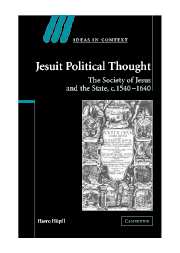Book contents
- Front Matter
- Contents
- Acknowledgements
- List of abbreviations
- Translations, references, and orthography
- Introduction
- 1 The character of the Society of Jesus
- 2 The Society's organisational ideas
- 3 The Society and political matters
- 4 The Church, the Society, and heresy
- 5 The confrontation with reason of state
- 6 Reason of state and religious uniformity
- 7 Jesuit reason of state and fides
- 8 Reason of state, prudence, and the academic curriculum
- 9 The theory of political authority
- 10 Limited government, compacts, and states of nature
- 11 The theory of law
- 12 The common good and individual rights
- 13 Tyrannicide, the Oath of Allegiance controversy, and the assassination of Henri IV
- 14 The papal potestas indirecta
- Conclusion
- Bibliography
- Index
- IDEAS IN CONTEXT
8 - Reason of state, prudence, and the academic curriculum
Published online by Cambridge University Press: 22 September 2009
- Front Matter
- Contents
- Acknowledgements
- List of abbreviations
- Translations, references, and orthography
- Introduction
- 1 The character of the Society of Jesus
- 2 The Society's organisational ideas
- 3 The Society and political matters
- 4 The Church, the Society, and heresy
- 5 The confrontation with reason of state
- 6 Reason of state and religious uniformity
- 7 Jesuit reason of state and fides
- 8 Reason of state, prudence, and the academic curriculum
- 9 The theory of political authority
- 10 Limited government, compacts, and states of nature
- 11 The theory of law
- 12 The common good and individual rights
- 13 Tyrannicide, the Oath of Allegiance controversy, and the assassination of Henri IV
- 14 The papal potestas indirecta
- Conclusion
- Bibliography
- Index
- IDEAS IN CONTEXT
Summary
REASON OF STATE AND PRUDENCE
Jesuits, then, were willing and able to show flexibility in accommodating moral rules to the demands of the prince's role, and the more orthodox the prince, the more sympathetic he was likely to find them. But reason of state and the politici demonstrated all too clearly where making allowances might lead. The original strategy of anti-Machiavellians (Jesuits and non-Jesuits alike) for keeping reason of state in check, while appropriating its plausibilities and chic, was to distinguish ‘true’ reason of state from the machinations, designments, politickes, practiques/Praktiken, fraud, worldly wisdom, craft, and cunning typical of the ‘false’ variety. But more convincing than any such merely verbal distinction was the equation of true reason of state with prudence. Prudence had always meant the competence and judgement in handling affairs that goes beyond merely knowing rules, and which can be learnt only by practice and experience. On the most charitable interpretation, reason of state operated in circumstances where strict adherence to the ordinary rules would yield perverse results. That this might happen if laws were too strictly executed was already a cliché in Cicero's day. Reason of state generalised and radicalised this perception into the distinction between what circumstances (‘necessity’) demanded, and the ordinary rules of morality, religion or piety, and law.
- Type
- Chapter
- Information
- Jesuit Political ThoughtThe Society of Jesus and the State, c.1540–1630, pp. 164 - 185Publisher: Cambridge University PressPrint publication year: 2004



